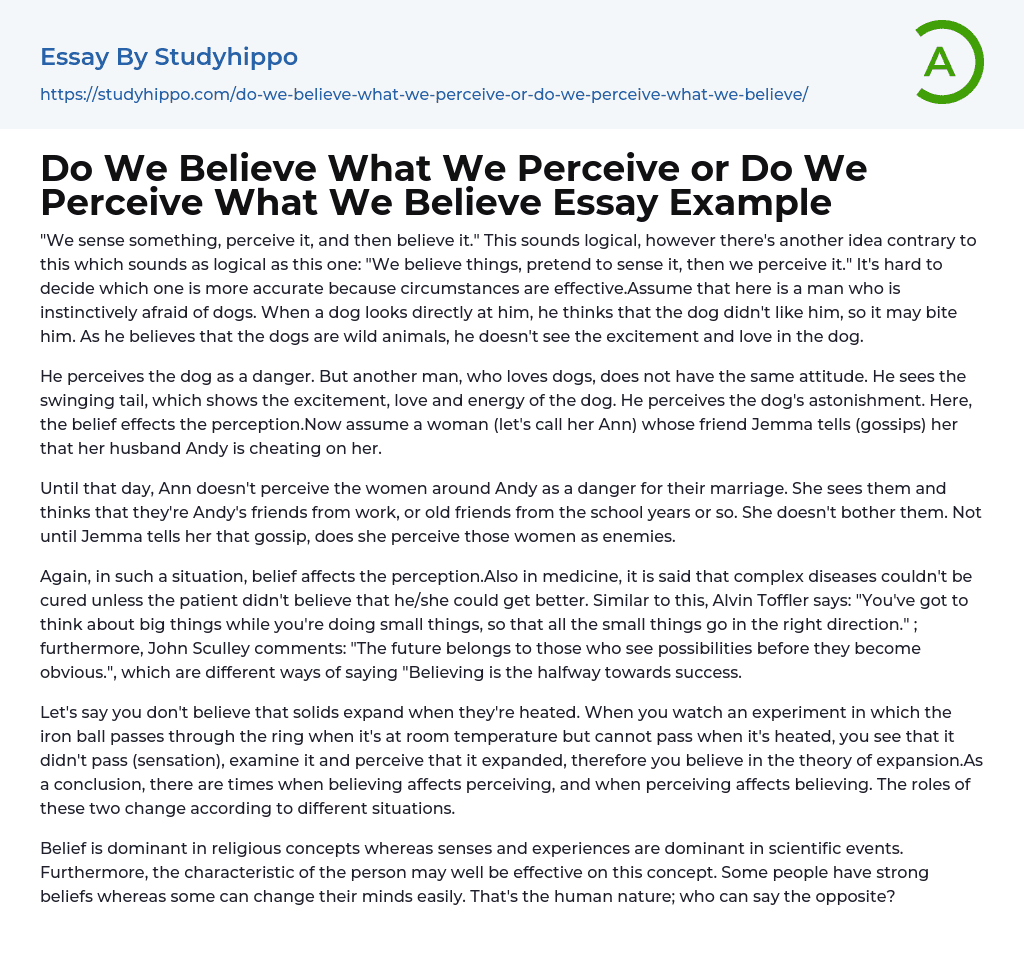

Do We Believe What We Perceive or Do We Perceive What We Believe Essay Example
"We sense something, perceive it, and then believe it." This seems logical, but there is an equally logical notion that goes against this: "We believe things, pretend to sense them, and then perceive them." It is difficult to determine which is more accurate because circumstances play a significant role. For instance, imagine a man who has an inherent fear of dogs. When a dog stares directly at him, he interprets it as dislike and a potential threat to bite him. Since he believes that dogs are wild animals, he fails to recognize the enthusiasm and love the dog may have. Instead, he perceives the dog as a source of danger.
Another man, who has a love for dogs, has a contrasting attitude. He observes the wagging tail as a display of the dog's excitement, affection, and liveliness. He also notices the d
...og's astonishment. In this scenario, perception is influenced by belief. Now consider a woman named Ann. Her friend Jemma informs her (gossips) that her husband Andy is being unfaithful. Up until that point, Ann did not perceive the women around Andy as a threat to their marriage.
Upon seeing them, she assumes that they are acquaintances of Andy from work or old school friends. At first, she doesn't pay attention to them. It is only when Jemma shares some gossip with her that she begins to view those women as adversaries. Once again, belief plays a role in perception. This concept applies to medicine as well, where it is believed that curing complicated illnesses is not possible unless the patient has the faith in their own recovery.
Alvin Toffler expressed similar ideas, stating that one must conside
big things while engaging in small tasks in order for everything to align in the correct direction. Additionally, John Sculley remarked that the future belongs to those who can envision possibilities before they become apparent. Both statements convey the same message that belief is crucial for attaining success. For example, if you do not believe that solids expand when heated, observing an experiment where an iron ball cannot pass through a ring when heated will lead you to believe in the theory of expansion after perceiving its expansion. In conclusion, there are instances where belief influences perception and vice versa, with the roles of these two elements varying according to different circumstances.
Belief, a dominant factor in religious concepts, differs from scientific events where the emphasis lies on senses and experiences. Additionally, personal characteristics can significantly influence this concept. While some individuals possess unwavering beliefs, others are more prone to changing their minds. Such is the nature of humanity; who can argue otherwise?
- Belief essays
- Deontology essays
- Ethical dilemma essays
- Moral essays
- Normative Ethics essays
- Values of Life essays
- Virtue essays
- Virtue Ethics essays
- Work Ethic essays
- Activity essays
- Believe essays
- Comfort Zone essays
- Dance essays
- Fashion essays
- Fishing essays
- Fitness essays
- Freedom essays
- Habits essays
- Healthy Lifestyle essays
- Hobby essays
- Hunting essays
- Interests essays
- Justification essays
- Moment essays
- Optimism essays
- Peace essays
- Perfume essays
- Shoes essays
- Shopping essays
- Silence essays
- Superstition essays
- Survival essays
- Vegetarianism essays
- Welfare essays
- Worldview essays
- Adoption essays
- Aunt essays
- Babies essays
- Bedroom essays
- Caring essays
- Children essays
- Daughter essays
- Divorce essays
- Dog essays
- Dysfunctional Family essays
- Family Tradition essays
- Family Values essays
- Father essays
- Foster Care essays
- Friends essays



